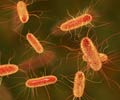Scientists have found that vaccinating cattle against the E. coli O157 bacterium could cut the number of human cases of the disease by 85%.

The vaccines that are available for cattle are rarely used, buc could be significant.The research was lead by a team of researchers at the University of Glasgow in collaboration with the University of Edinburgh, the Royal Veterinary College, Scotland's Rural College, Health Protection Scotland, and the Scottish E. coli O157/VTEC Reference Laboratory.
The study, published in the online journal PNAS, used veterinary, human and molecular data to examine the risks of E. coli O157 transmission from cattle to humans, and to estimate the impact of vaccinating cattle.
The risk of E. coli O157 infection is particularly significant when the cattle are 'super-shedding' – excreting extremely high numbers of bacteria in their faeces for a limited period of time. Vaccines against the bacteria exist that can reduce super-shedding. As a consequence, the researchers predict that vaccinating cattle could reduce human cases by nearly 85 percent, far higher than the 50 percent predicted by studies simply looking at the efficacy of current vaccines in cattle.
These figures provide strong support for the adoption of vaccines by the livestock industry, and work is now underway to establish the economic basis for such a programme of vaccination. In addition, research is continuing in Scotland by the same collaborative grouping to develop even more effective vaccines that would further reduce the impact on human disease.
Lead author, Dr Louise Matthews, Senior Research Fellow in the Institute of Biodiversity, Animal Health and Comparative Medicine, said: "E. coli O157 is a serious gastrointestinal illness. The economic impact is also serious – for instance studies in the US suggest that healthcare, lost productivity and food product recalls due to E. coli O157 can cost hundreds of millions of dollars each year.
Advertisement
In Scotland, an average of 235 culture positive cases of E. coli O157 infection per year (i.e. people who had the organism in their stools) were notified to Health Protection Scotland from 2008 to 2012.The vaccines that are available currently have poor take-up: one version in the US is not fully licensed because medicines for veterinary use must show that animal health is improved. This is problematic because E. coli O157 does not harm cattle and assessing the impact of treatment involves coordination between human and veterinary health practitioners.
Advertisement
Source-Eurekalert








